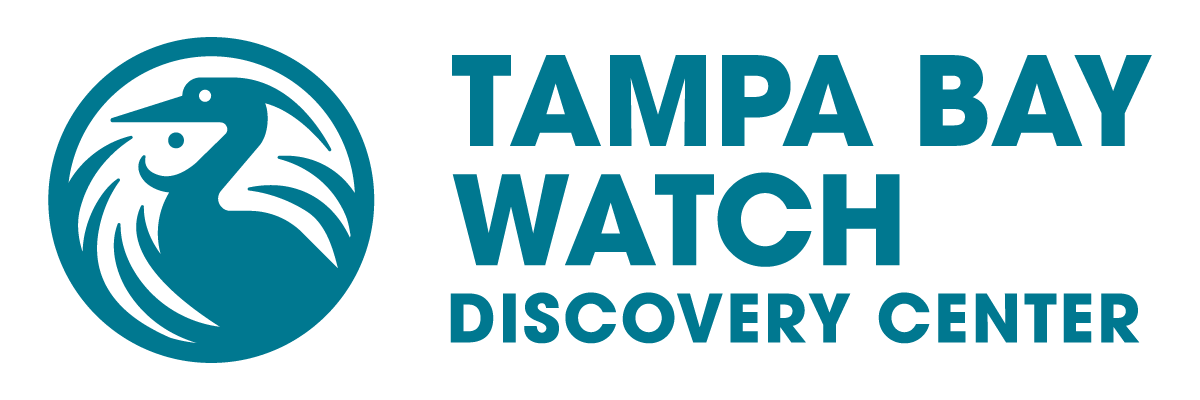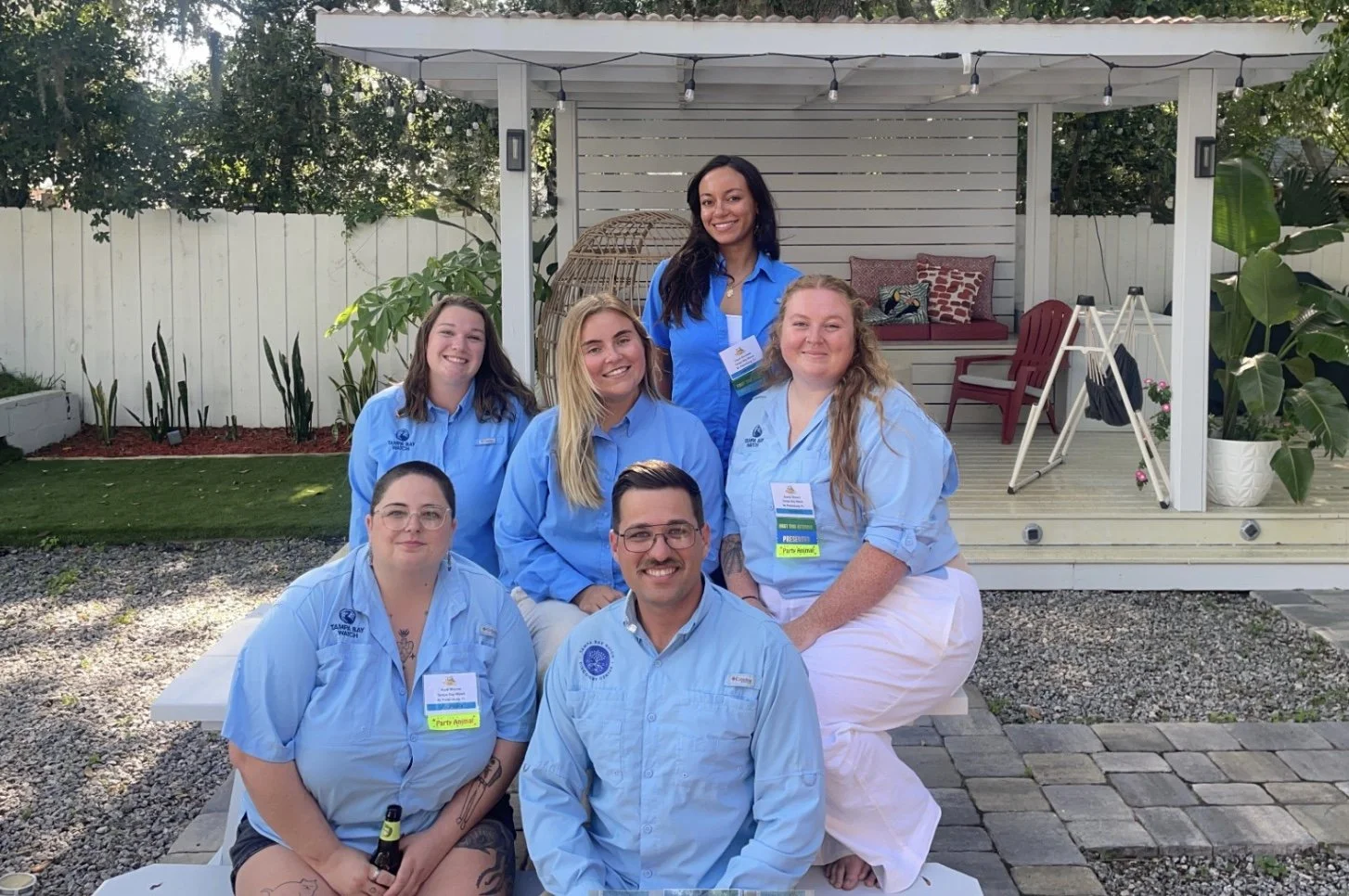Learning In and Out of the Classroom
Tampa Bay Watch educators recently attended the Florida Marine Science Educators Association (FMSEA) 2025 Annual Conference. FMSEA brings together dedicated individuals and organizations who are working to increase public knowledge and understanding of diverse marine and freshwater ecosystems. Held this year in St. Augustine, educators and professionals from around the state came together to network, attend interactive workshops, share research, and offer fresh methods for student engagement. This conference allows TBW educators to stay informed on best education practices while building partnerships with fellow marine science educators and organizations.
Top: Cayla , Middle (from left to right): Izzy, Mandi, Lexi , Bottom (from left to right): Madison, Dakoeta
Two of TBW’s own educators had the chance to present during FMSEA. Dakoeta Pinto, who joined the team in 2022, and Alexia Stewart, who started in 2024, both specialize in informal education and are passionate about inspiring the next generation to become environmental stewards. Dakoeta’s presentation provided strategies and key insights for collaborating with community partners to design diverse, impactful programs tailored for adult learners. Alexia spoke on engaging high school students through a new ichthyology program that explores fish anatomy through hands-on activities and team-building exercises.
We spoke to the five TBW educators who attended FMSEA to find out how the event will continue to inspire them both inside and outside of the classroom this year:
What is one thing you learned at FMSEA that you’re excited to bring back to TBW’s programs?
Cayla- I’m looking forward to experimenting with an activity I saw during Dr. Marjorie Dozier’s Invert Microplastics session. Over the course of a semester, she raises brine shrimp with her students to observe how microplastics can disrupt their diet. I would like to tailor this project to our current plankton program to show the impact of microplastics in Tampa Bay’s estuary.
Dakoeta- I'm excited to try to prank some of our summer campers using the strategies I learned in Aly Tockstein’s Navigating Narratives session. There are a few parody websites designed to teach kids about how to identify disinformation, which is so important in the internet age. One example attempts to convince them that a “tree octopus” exists.
Izzy- I'm hoping to see TBW excel in growing a community of youth advocates. I saw from several organizations how they are utilizing their programs for all age ranges to continue to educate the youth throughout their different life stages. Many of these organizations frequently see their previous students return to be interns, volunteers, and staff members, who stick around for a long time to mentor the next generations.
Mandi- I learned about mangrove propagation from Johnathan Bysura, which could be a cool project for one of our programs. It can help students understand the process of growing plants, the scientific method, the importance of mangroves, and contributing to restoration.
Which session or topic really grabbed your attention or surprised you?
Izzy- Mary Thaler’s nature journaling session was cool! I’ve known about the concept of nature journaling for some time but had not thought about the possibilities as a tool in the classroom. Nature journaling can be a great tactic to foster attention to details, not only about the physical characteristics of what they’re journaling about, but also the surrounding environment. I was surprised to see how it can also be used to teach other skills, such as math and vocabulary.
Lexi- The session that I took the most from was led by Dr. Bryan Nichols from Florida Atlantic University, focusing on expanding the current Ocean Literacy Principles. At Tampa Bay Watch, we use these principles regularly, so I was especially drawn to the discussion-based format that explored how they could include elements like compassion, emotional connection, and adaptability. A standout moment was when participants shared how their organizations use the principles and how they might be expanded, offering a wide range of inspiring perspectives. I left the session motivated to rethink our approach at TBW, aiming to deepen students’ emotional and personal connections to the estuary alongside their scientific understanding.
Mandi- I was surprised that boat strikes are such a problem for dolphins. It is commonly thought that they can get out of the way quickly, but the presenter has seen several deaths and injuries from dolphins being hit by boats. Also, in the Indian River Lagoon, the noise pollution is very loud from constant boat traffic, making it harder for dolphins to navigate using echolocation. The Indian River Lagoon is the most densely populated area of dolphins in the entire world. This information makes me very curious about the health and behavior of the dolphins in Tampa Bay.
“...aiming to deepen students’ emotional and personal connections to the estuary ”
Why do you think it’s important to connect face-to-face with other environmental educators from across Florida?
Cayla- It's inspiring and uplifting to be surrounded by dedicated marine educators and conservationists. Also, staying informed about new research, conservation efforts, and education tactics throughout the state is crucial for TBW to advance and grow.
Dakoeta- We are human beings. It is in our nature to connect in this way with each other. Seeing everyone's smiles and being around other passionate people is a big motivator and reminder that there is still a reason to continue along the path we are on. I also enjoy being able to network in a fun and casual setting like FMSEA.
Lexi - Connecting face-to-face with environmental educators from across Florida was incredibly inspiring and reaffirmed the value of our shared work. These in-person conversations foster a strong sense of community, spark new ideas, and highlight the innovative efforts happening statewide. At a time when the enourmous need for environmental education and advocacy can feel overwhelming, the conference was a reminder of the many passionate, creative professionals working toward the same mission.
After attending this conference, is there an idea or goal you’re inspired to explore more deeply in the next year?
Cayla – This year, I’m inspired to make our programs feel more relatable to our students through art. At FMSEA, the sessions that stuck with me the most were the ones that tied personal experience and expression to nature. Showing our students in a creative way that we all can be affected by the health of the environment is a great first step in building stewardship.
Lexi - After this year’s conference, I felt inspired to expand our programming for older students and adults, addressing a clear gap in marine science education for these age groups. Several sessions emphasized the importance of fostering lifelong engagement with environmental science, which I’m excited to incorporate into our work. In the coming year, I plan to build on our existing programs with new, age-appropriate experiences shaped by the ideas I gained at FMSEA.
Izzy - I am excited to explore the idea of finding ways to get students more in-tune with nature. What I mean by this is not just teaching students about nature but really fostering a deeper level of understanding nature in each student’s mind. I am hoping to challenge students to make observations, both broad and specific, and find ways to relate topics to each other and relate the natural world to human experience.
Mandi- I am inspired to bring more experiential learning to our programs, such as more outdoor time, more scientific inquisition led by students, and hopefully more documentation of dolphins and manatees to better understand and educate about these species in our own backyard.

